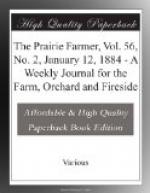“I am innocent, gentlemen,” he said, slowly, “but I refuse to tell you of whom I bought the hides.”
I understood him. Could Harry White be a cattle thief? I felt as if I were going mad.
“What shall we do?” whispered Ted, cocking his revolver?
Suddenly a bright red light illuminated the heavens, followed by clouds of black smoke and a queer crackling noise. A yell from the men—Gil Mead’s voice above the rest. The hay-stack was on fire. It seemed to me in the gale around it that I could see a foreign-looking human vanishing across the plain.
The men mounted their horses, Gil Mead at the head, and set off across the fields at a mad gallop. They must save the stack. They left Jack, bound hand and foot, and guarded by one man.
Shep, the wonderful dog, had kept by us until now, slinking in the dark shadows. Now, gliding sidewise and still, he reached the man on guard whose back was to us, and with no warning growl caught him by the throat with strong white teeth that could choak a coyote in a second. The man, who was in a sitting posture, fell back with a groan. Ted struck him over the head with the butt of the revolver, and pulled off the dog. I cut Jack’s bonds with a knife. He looked at us wonderingly and staggered to his feet.
“Never mind how we came, Jack,” I said; “quick, mount the horse beyond the bridge, and ride to Denver for your life. They will not harm a woman and child.”
“Harry White,” he muttered, the loyal soul that even now could think of another’s danger.
“I will tell him.”
“No, no; not of this—only say, if he stole the cattle, to fly the country. They will find out, sooner or later.”
He galloped down the road. Ted and I mounted, calling off Shep, who sat on his haunches watching the unconscious man, and then we, too, sped down the road. The hay-stack was giving out great columns of black smoke, but the fire was dead.
Ahead of us was a riderless horse, Dolly, who greeted her master with a joyful whinny. Where was Yik Kee? Then Dot, my horse, shied from the road at a recumbent black figure. It was the indomitable Yik Kee, who had crawled all the way from the stack on his stomach, so that he could not be seen, after lying in the ditch till the blaze had faded out. “Hump! no catchee Chinee; heap sore,” he said, laconically rubbing his stomach.
He mounted Dolly, and we rode on to White’s ranch. Harry rushed out at the sound of horses’ feet, at midnight. There, under the twinkling stars I looked into his eyes, and I told him the whole story. He showed no guilt, but only said we must stay the night at his ranch, for the men would come back to Jack’s for him, and then mounting his fleet colt rode off down the road. I comforted his mother as best I could. At day-break we rode home.
Mary was in a wild state of alarm. Where had we been? Where was Jack? and how cruel we were to leave her alone. She said that at one o’clock three masked men had come to the house and searched it and the premises, and had not molested her or the children, only asking where Jack was, very sternly and sharply.




